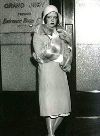Film Star Clara Bow's Personal Secretary Was Wrongly Convicted of Grand TheftBy Hans Sherrer Justice Denied Magazine, Vol. 2, Issue 7 Yale law Professor Edwin Borchard's 1932 book, Convicting the Innocent, exposed for the first time how widespread wrongful convictions are in this country. Daisy DeVoe's wrongful 1931 conviction was among the innumerable cases not included among the sixty-five documented in Professor Borchard's book. In 1929, Clara Bow was the most popular film star in the world. Known as the "It" girl, she was Hollywood's first sex symbol. As the star of Wings, the first movie selected for the Best Picture Award (1927-28), Clara accepted that film's Oscar from Douglas Fairbanks. She was deluged with 45,000 fan letters a month and making a fortune for Paramount studios. A downside of Clara's success, however, was that she was being robbed blind by her business manager, her household staff, and relatives. Also, Paramount was working her to the bone under a long term contract that was financially favorable to them. Teetering on bankruptcy and foreclosure on her house, in early 1929 Clara hired Miss Daisy DeVoe as her personal secretary to manage her finances. Clara opened a "special account" into which her paychecks were deposited, and from which Daisy paid Clara's bills. Twenty-two months after hiring Daisy, Clara was financially healthy. Furthermore, thanks to Daisy's deposit of more than 50% of Clara's salary into a "trust account, she had $249,000 in savings. However, Daisy was fired in November 1930 after she lost a power struggle involving Clara's boyfriend and future husband, Rex Bell, who Daisy suspected was stealing from Clara. Daisy asked for a severance settlement that Clara interpreted as blackmail. Rebuffing Daisy when she tried to explain to Clara that she didn't want anything but her job back, Rex notified the police. Los Angles District Attorney Burn Fitts was friendly with Paramount studio executives. At their behest Daisy was arrested on November 6, 1930, and she was interrogated for twenty-seven straight hours. Denying any wrongdoing, she steadfastly refused to sign a confession that she had stolen money from Clara, exclaiming: "I haven't done anything!" (Clara Bow, p. 213). Although no charges were filed against her, Daisy was jailed and she wasn't allowed to contact a lawyer. DA Fitts also raided Daisy's safe deposit box without a warrant in an effort to try to find something incriminating against her. After her release, Daisy filed a false imprisonment suit against DA Fitts. In retaliation, and as a defense against the suit, DA Fitts induced a Grand Jury to indict Daisy on thirty-five counts of grand theft, each carrying a one-to-ten year sentence. The indictment was based on Daisy's alleged mishandling of funds in Clara's "special account." Daisy's trial began on January 13, 1931 amidst a carnival-like atmosphere with thousands of people milling around the L.A. County Courthouse. The trial was reported as news around the world. Although assistant DA David Clark tried to vilify Daisy, he didn't present proof during the trial that she had even done anything except conscientiously take care of Clara's finances. After three days of deliberations and twenty ballots, the jurors returned with thirty-four not guilty verdicts and inexplicably, one guilty verdict. The case against Daisy was so spurious that she couldn't have stolen the money involved in the one grand theft count of which she was convicted [of], because it related to an $825 check signed by Clara that was used to pay her income taxes. Nevertheless, the judge, also friendly with Paramount executives, showed no mercy when he sentenced Daisy to 18 months imprisonment. The unflattering details of Clara's private life made public during Daisy's trial added to revelations about her free-spirited behavior that occurred during several previous scandals. The success of her career depended on the public's good will. So while Daisy went to prison, stress and years of overwork led to Clara having a physical and emotional breakdown. In spite of her condition, Paramount forced Clara to return to work to finish a movie. When it bombed at the box office, the studio was convinced she no longer had any star value and that her scandals made her a liability to the studio. Without Daisy's advice to rely on, Clara was conned out of an additional $60,000 when Paramount terminated her contract in the summer of 1931. Thus, six months after Daisy's trial, Clara Bow was out of the movies. She made a comeback in 1932, but after two moderately successful movies she left the film industry for good at the age of 28. The absurdity of Daisy DeVoe's wrongful conviction is that Clara was only able to retire when she did because of the money Daisy had faithfully deposited into her "trust account". When Clara died at 60 in 1965, interest and investments had almost doubled the trust account amount deposited by Daisy to $450,000. As for Daisy DeVoe, during her trial she had confronted her prosecutors Burn Fitts and David Clark by telling them: "You two are railroading me, and you'll both come to a bad end because of it." (Clara Bow, p. 284). Her words were prophetic. Four months after her conviction DA Clark was charged with a double murder, and DA Fitts committed suicide in 1973. After her release from prison, Daisy married and was involved in the aircraft industry until her retirement in 1968. Ironically, she was one the few people close to Clara Bow who didn't exploit her fame to their own advantage. Daisy died in 1996 at the age of 92. Sources: Clara Bow: Runnin' Wild By David Stenn, Cooper Square Press, NY, 2000, 368 pages. Clara Bow Encyclopedia Britannica, 1993 ed., Vol. 2, 435.
|


|
Poster for the movie Wings. The movie won the first Best Picture award, and as the female star in the movie, Clara Bow accepted the Oscar from Douglas Fairbanks. |
|
Clara Bow outside the LA County Grand Jury Room |